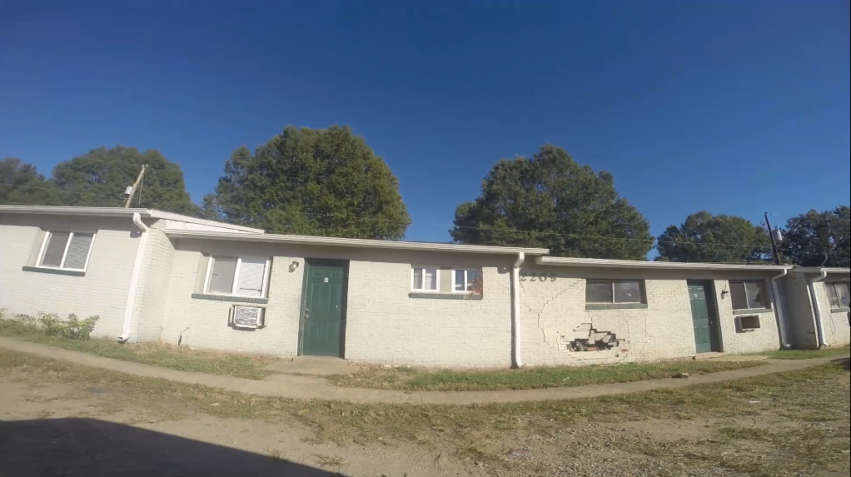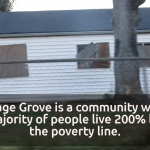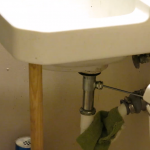
Safe affordable housing is complicated.
Building new or rehabilitating deteriorating housing requires putting together complex and expensive deals. The people with the money and power to accomplish this, therefore, make the decisions about what gets built and where. This may or may not match with what works best for the people who will live there or for the community as a whole.
Most of us don’t get the opportunity to make the development decisions but we do pay for the shortage of good places to live. Many pay with the quality—or even the length—of our lives. Even if we have adequate housing ourselves, we all absorb the costs of health care, schools, public safety, and social services when people have to choose between dangerous places or moving from homes they can’t afford. Some are displaced by gentrification when whole streets are transformed from high-risk to high-cost; others live in neighborhoods that just continue to export dollars, as rent payments out (to landlords out of state or across town) exceed investment coming in.
Fellow CELE bloggers describe the complexities of raising our voices, as neighborhood residents and community advocates, about the impact of housing decisions. (See blogs tagged Affordable Housing)
BUT… However difficult it is to speak up, we must do so. Here is what is at stake for us and our communities:
IF YOU COULD HEAR OUR VOICES, WOULD WE MATTER?
- We are the Greensboro tenants and homeowners living in over 9000 properties with health and safety risks, trying not to fall down broken stairs or get lead-poisoned or suffer allergic reactions to mold and cockroaches. Please hear our voices and see our stories collected by university students in the Reclaiming Democracy class.
- We are the 26,340 Greensboro households paying more than 30% of our income for rent and utilities. Many of us pay more than half of our paychecks so every month there are tough choices between buying food, getting prescriptions refilled, getting the car fixed to get to work, or paying child care.

- We are the 16,390 Guilford County tenants receiving notices of Summary Ejectment—eviction hearings—in the past year because there wasn’t enough money to pay rent, much less catch up past due rent and pay court costs.
- We are the 9087 school children who move at least once during the academic year because of changes in our family’s housing situations.
- We are the uncounted people who live in the shadows, without housing or perhaps without immigration documents, hoping no one will notice us.

IF WE WOULD RAISE OUR VOICES, WOULD IT MATTER?
- We are the employers who are short-staffed when workers don’t show up because their fragile housing situations are falling apart, again.
- We are the doctors and nurses and respiratory therapists who accomplish miracles in the hospital, yet patients go home to the same conditions that made them sick.
- We are the neighbors whose property values and safety are compromised by constant turnover, deteriorating housing, and abandoned buildings.
- We are the hundreds of volunteers who build houses and staff homeless shelters and listen to heart-breaking sagas, yet it never seems to make enough difference.
- We are the people with good places to live who used to think that the persistent shortage of safe affordable housing does not affect us, but now we want to know how to deal with the complexities.
We—all of us—DO matter. We CAN listen to each other’s voices and come to understand how what matters to us is inextricably tied to what matters to others. And we CAN find ways to do things differently so that more people can have stable places to live.

The City of Greensboro and Community Foundation of Greater Greensboro have launched the Housing Our Community initiative and convened work groups to consider many voices, planning the best ways for our community to:
- Improve the quality and increase the quantity of affordable housing
- Equip people to better afford, access, and maintain housing
- Create a culture of collaboration to support long-term solutions for affordable housing
- Commit to sustainable, long-term resources for affordable housing
To begin this work, we were asked to choose six words to describe why we invest our time and energy in Housing Our Community. My six words are: “WHERE WE LIVE AFFECTS EVERYTHING ELSE”. Our work, our schools, our transportation, our votes, our health, even how long we live, all depend on where we have the opportunity to live. Discrimination and poverty limit everyone’s choices for housing, for life.
So I must raise my voice to insist that we collaborate, innovate, fundraise, and LISTEN to each other for safe, affordable housing.
I urge decision-makers to examine the policies—such as zoning and code enforcement and fair housing laws and housing financing—that shape what kind of housing in what condition is located in each part of our city, at what price, welcoming to all.
Will you join me in this advocacy? If we could hear your voice, it would definitely matter. SPEAK UP!
Beth – thanks for continuing the thread about the great need for affordable housing and how substandard housing, evictions and huge disruptions and dangers that affect so many people in every community.
Per the CELE blog’s focus on the goals and methods of community engagement, do you see the Housing Our Community initiative as advocacy to persuade “The people with the money and power” to do the right thing? Is it a matter of landlords doing much more to assure that their properties are safe? As landlords fix things up, doesn’t that put pressure on their income and thus possibly push rental housing prices higher?
I’m not suggesting that you or anyone else needs to courteously invite people into the advocacy stream for affordable housing. I am interested in how you and allies see the process – when and where the focus is on advocacy and political power (which may be a win-lose frame) and when there are engagement opportunities for creative problem-solving that might meet some of the interests of “The people with the money and power.”
I see that the HCI is focused on “a shared housing vision” which can focus resources. My understanding is that your focus is on the gap in the private sector between the need and the supply of safe, affordable housing, to what degree are builders and landlords a part of creating the housing vision? Thanks, John